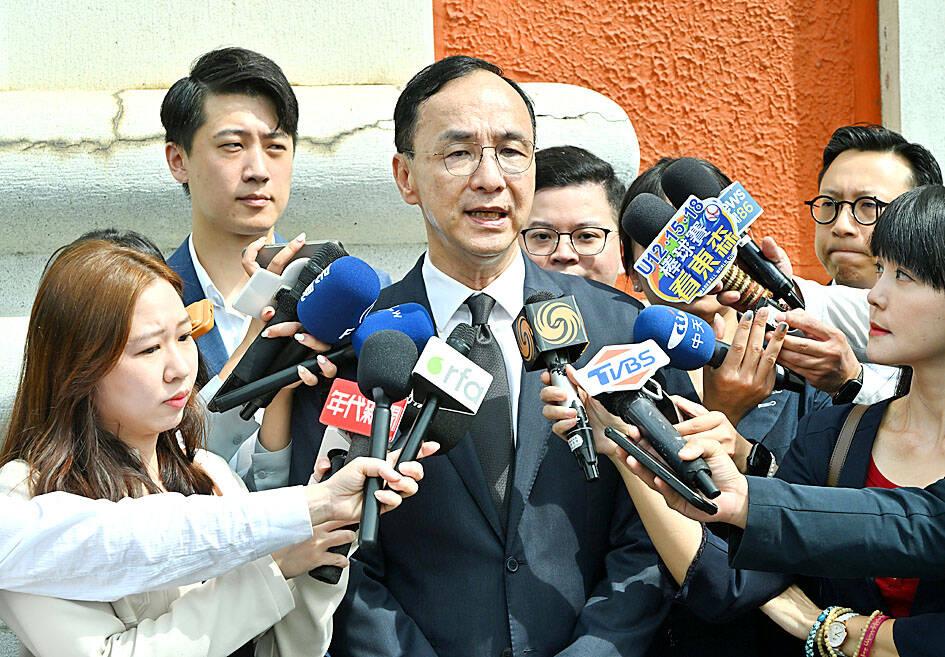The presence of Taiwanese politicians at China’s military parade tomorrow would send the wrong message to Beijing and the international community about Taiwan’s sovereignty and democracy, a national security official said yesterday.
China is to hold the parade tomorrow to mark the 80th anniversary of Japan’s surrender in World War II.
By bringing together leaders of “anti-West” governments such as Russia, North Korea, Iran and Belarus, the parade aims to project a symbolic image of an alliance that is cohesive and unbending against Western countries, the national security official said, speaking on condition of anonymity.

Photo: Tien Yu-hua, Taipei Times
Former Chinese Nationalist Party (KMT) chairwoman Hung Hsiu-chu (洪秀柱), former KMT secretary-general Lee Chien-lung (李乾龍) and KMT Central Standing Committee member Ho Ying-lu (何鷹鷺) might attend the parade, they said.
However, Lee said he would not attend due to health concerns, while Ho said she was not invited, but would be willing to attend.
A source said Hung would make an announcement about the matter on Facebook by 10am today.
Other potential attendees include more than 10 New Party members led by Chairman Wu Cheng-tien (吳成典) and Deputy Chairman Lee Sheng-feng (李勝?), Labor Party Chairman Wu Rong-yuan (吳榮元), and Reunification Alliance Party Deputy Chairman Lee Shang-shien (李尚賢), the national security official said.
The high-profile participation of KMT members would confuse the diplomatic image of Taiwan, giving the international community the impression that a Taiwanese mainstream political party acquiesces or agrees with Beijing’s stance on Taiwan, they said.
The parties of anyone that attends should make it clear that such behavior does not represent Taiwan or Taiwanese to avoid confusion in the international community, they said.
KMT Chairman Eric Chu (朱立倫) said that legal cross-strait visits by individuals should be allowed, adding that high-level public servants must adhere to regulations.
Democratic Progressive Party Legislator Chiu Chih-wei (邱志偉) said that attending the parade is equivalent to treason and should have legal consequences.
Additional reporting by Chen Yu-fu and Lin Hsin-han

POSITIVE DEVELOPMENT: Japan and the US are expected to hold in-depth discussions on Taiwan-related issues during the meeting next month, Japanese sources said The holding of a Japan-US leaders’ meeting ahead of US President Donald Trump’s visit to China is positive news for Taiwan, former Japan-Taiwan Exchange Association representative Hiroyasu Izumi said yesterday. After the Liberal Democratic Party’s landslide victory in Japan’s House of Representatives election, Japanese Prime Minister Sanae Takaichi is scheduled to visit the US next month, where she is to meet with Trump ahead of the US president’s planned visit to China from March 31 to April 2 for a meeting with Chinese President Xi Jinping (習近平). Japan and the US are expected to hold in-depth discussions on Taiwan-related issues during the

‘LIKE-MINDED PARTNER’: Tako van Popta said it would be inappropriate to delay signing the deal with Taiwan because of China, adding he would promote the issue Canadian senators have stressed Taiwan’s importance for international trade and expressed enthusiasm for ensuring the Taiwan-Canada trade cooperation framework agreement is implemented this year. Representative to Canada Harry Tseng (曾厚仁) in an interview with the Central News Agency (CNA) said he was increasingly uneasy about Ottawa’s delays in signing the agreement, especially as Ottawa has warmed toward Beijing. There are “no negotiations left. Not only [is it] initialed, we have three versions of the text ready: English, French and Mandarin,” Tseng said. “That tells you how close we are to the final signature.” Tseng said that he hoped Canadian Prime Minister Mark Carney

President William Lai (賴清德) yesterday bestowed one of Taiwan’s highest honors on Saint Vincent and the Grenadines (SVG) Ambassador Andrea Clare Bowman in recognition of her contributions to bilateral ties. “By conferring the Order of Brilliant Star with Grand Cordon on Ambassador Bowman today, I want to sincerely thank her, on behalf of the Taiwanese people, for her outstanding contribution to deepening diplomatic ties between Taiwan and SVG,” Lai said at a ceremony held at the Presidential Office in Taipei. He noted that Bowman became SVG’s first ambassador to Taiwan in 2019 and

A man walks past elementary school artworks at the Taipei Lantern Festival in Ximen District yesterday, the first day of the event. The festival is to run from 5pm to 10pm through March 15.